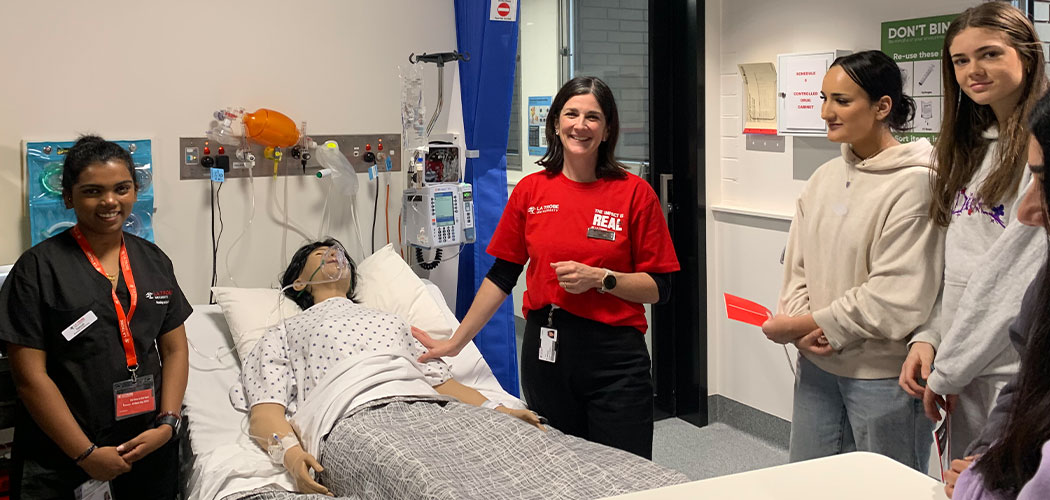“As nurses, from our graduate year onwards, we are teachers,” says La Trobe University nursing lecturer Niki Lillibridge.
“We teach our own as soon as we become professionals.”
So, after working in nursing education and critical care for over 15 years, its little wonder she transitioned into academia, where she now plays a pivotal role in shaping the next generation of Australia’s nurses.
Niki currently has two primary roles – postgraduate coordinator for the university’s Acute Care stream within the Master of Nursing, and final-year undergraduate coordinator for the Royal Melbourne Hospital Clinical School.
La Trobe’s clinical school model, which includes utilising simulation centres at the RMH, allows students to get a real taste of what their future will look like, Niki says.
“The idea is that they get to know a hospital, they go regularly for classes, and they attend clinical placements there, so that they’re immersed in the hospital experience to better prepare them for the workforce. They are immersed in the culture of the hospital, even if they don’t end up doing their graduate year at their hospital, it’s helpful to have an understanding of the organisation before you become a professional.”
Niki’s teaching philosophy is based around pillars like constructivism, connectivism, collaboration and storytelling.
“I believe that you have to incorporate the student as a person before they walk into your teaching and learning space,” she explains.
“They’re going to bring their own experiences, the people that they love, their experience of hospitals, with them. It’s not a passive transitioning of knowledge. The learners construct their knowledge based on who they are and how you teach them. It’s very student-centric in that I respect every student is an individual and I might need to tailor my teaching based on their needs.”
Storytelling is an essential nursing practice that has the power to bring students together, she adds.
“It brings them into a space where they can share their stories and then build on their learning. When you present, for example, a clinical scenario, it can bring them together in that shared knowledge and they can start to construct the answers and work through the problems together, which is what they’ll be doing in the clinical space.”
Aside from the obvious challenges triggered by the COVID-19 pandemic, Niki considers the rapid emergence of Artificial Intelligence (AI) one of the key issues facing nursing students and the broader profession.
“One of the biggest challenges we’re facing right now is AI and how to use it in an ethical and safe way, both in the academic setting and in the healthcare setting,” she says.
“It’s about universities readjusting their graduate capabilities because the reality is our graduates need to be fluent in AI because it already is, and will continue to be, a bigger part of healthcare.”
Amid the changing landscape, students need support with the information and tools to make the right decisions when it comes to their studies, Niki says.
“Students can use generative AI to potentially cheat, which we obviously don’t want them to do. I say to my students ensure you are using AI to enhance your learning, not to learn for you.
“AI can assist students by generating practice test questions to assist them with exam preparation or break down a complex concept that they might be having trouble understanding It’s about using generative AI wisely and ethically to enhance your knowledge rather than expecting it to learn for you.”
Niki says nursing education is constantly evolving, including growing efforts to increase students’ interaction and exposure to clinical settings before they begin their careers.
“At the moment, we are focused on scaffolding knowledge and ensuring the students interact with case-based learning. Our students engage with simulation-based learning at Latrobe, where they will step into a safe simulated learning environment and are presented with an unwell patient and a team to work with, just like they would in the clinical environment. Students navigate that space together with an experienced nurse academic guiding the simulation. We strive to be innovative in our approaches to teaching and learning by incorporating experiences like escape rooms. where students answer clinical questions regarding advanced pathophysiology or clinical decision making that then unlock the next clue in the management of a complex patient.
Virtual and augmented reality learning is another emerging area, she says.
“Students are given augmented or virtual reality headsets, and the possibilities are endless. Students can potentially step into a virtual reality construct of the human heart and watch how blood flows through or they can be in an Emergency Department setting up for a trauma patient to be admitted.
Her best piece of advice for graduating students is to choose where they want to apply to their graduate year carefully.
“Follow the hospitals you’re thinking of applying to on social media, understand the culture, their approach to supporting new graduates, and what the strategic plan is for the future, Thoroughly research where you will be spending a pivotal foundational year as this year will contribute to shaping your career.








